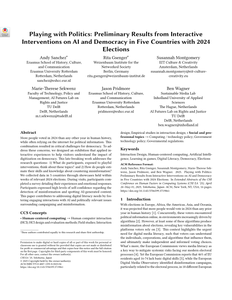While there is extensive research on how Russian interference – in particular Russian disinformation operation – has played out in different European countries, indications of Russian interference directly targeting EU, its institutions or policies received little attention. This paper argues why there is good reason to assume that the EU, its institutions and its policies are an ideal a target for authoritarian regimes to exploit. It then explores in what ways, if any, Russian disinformation campaigning targeted EU institutions and their policies during the political and electoral campaigns leading up to the European Parliament (EP) elections of May 2019. In this context disinformation campaigning in terms of both network flows and contents (‘narratives’) have been examined, on the basis of a review of various reports identifying Russian interference and disinformation and of analyses of overall disinformation flows in Europe and the use of a database monitoring occurrences of disinformation.
MULTIFILE
This chapter enquires into the resonance of junk news on Twitter during the campaign periods prior to the 2019 Dutch Provincial elections and European Parliamentary elections. Querying Twitter for political topics related to the two elections, and various divisive social issues such as Zwarte Piet and MH17, we analyse the spread and prominence of problematic sources. We also examined the claim that Twitter is susceptible to abuse by bot and troll-like users, and found that troll-like users were active across all political and issue spaces during the Dutch Provincial elections of 2019. Divisive issues remain steadily (even if marginally) active in junk news and tendentious news throughout the tested time frames, suggesting these issues are year-round rather than event-based or seasonal, as they are in the mainstream media.
MULTIFILE
More people voted in 2024 than any other year in human history, while often relying on the internet for political information. This combination resulted in critical challenges for democracy. To address these concerns, we designed an exhibition that applied interactive experiences to help visitors understand the impact of digitization on democracy. This late-breaking work addresses the research questions: 1) What do participants, exposed to playful interventions, think about these topics? and 2) How do people estimate their skills and knowledge about countering misinformation? We collected data in 5 countries through showcases held within weeks of relevant 2024 elections. During visits, participants completed a survey detailing their experiences and emotional responses. Participants expressed high levels of self-confidence regarding the detection of misinformation and spotting AI-generated content. This paper contributes to addressing digital literacy needs by fostering engaging interactions with AI and politically relevant issues surrounding campaigning and misinformation.
MULTIFILE

The seaweed aquaculture sector, aimed at cultivation of macroalgal biomass to be converted into commercial applications, can be placed within a sustainable and circular economy framework. This bio-based sector has the potential to aid the European Union meet multiple EU Bioeconomy Strategy, EU Green Deal and Blue Growth Strategy objectives. Seaweeds play a crucial ecological role within the marine environment and provide several ecosystem services, from the take up of excess nutrients from surrounding seawater to oxygen production and potentially carbon sequestration. Sea lettuce, Ulva spp., is a green seaweed, growing wild in the Atlantic Ocean and North Sea. Sea lettuce has a high nutritional value and is a promising source for food, animal feed, cosmetics and more. Sea lettuce, when produced in controlled conditions like aquaculture, can supplement our diet with healthy and safe proteins, fibres and vitamins. However, at this moment, Sea lettuce is hardly exploited as resource because of its unfamiliarity but also lack of knowledge about its growth cycle, its interaction with microbiota and eventually, possible applications. Even, it is unknown which Ulva species are available for aquaculture (algaculture) and how these species can contribute to a sustainable aquaculture biomass production. The AQULVA project aims to investigate which Ulva species are available in the North Sea and Wadden Sea which can be utilised in onshore aquaculture production. Modern genomic, microbiomic and metabolomic profiling techniques alongside ecophysiological production research must reveal suitable Ulva selections with high nutritional value for sustainable onshore biomass production. Selected Ulva spp lines will be used for production of healthy and safe foods, anti-aging cosmetics and added value animal feed supplements for dairy farming. This applied research is in cooperation with a network of SME’s, Research Institutes and Universities of Applied Science and is liaised with EU initiatives like the EU-COST action “SeaWheat”.